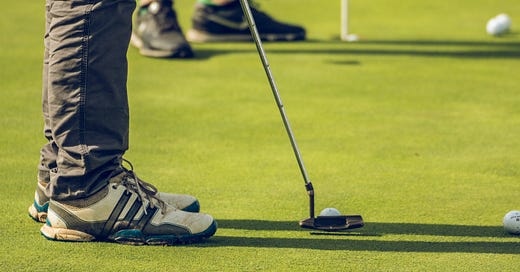First Day Jitters
Last Tuesday afternoon I volunteered for the Special Olympics Golf. It was my first time. My friend invited me to join her as a volunteer.
I was a little nervous. I knew that each athlete had some level of intellectual disability, but I was having a little trouble wrapping my mind around what that actually meant.
Twenty or so of us volunteers and about the same number of athletes, mostly teens and older, gathered outside the clubhouse at the municipal golf course. You could distinguish the volunteers from the athletes by the black, Special Olympic logo hats and black shirts we wore. Oh, and we sported giant name badges with our first names in large black print. The athletes had name badges, too, with their names in large red letters.
It was the first week, which, I think, accounted for some of the general milling around before we were paired up, mostly one volunteer to one athlete. Since my friend and I were both new volunteers, we were sent to the driving range with Garth (name changed) and his mom. Garth was just like us - new. Garth was a tall, spindly teen with short, sandy brown hair, bright blue eyes, brown glasses, and a beaming smile. He wore a sky-blue t-shirt and khaki shorts. He was quiet.
Little Piles of Golf Balls
Athletes and volunteers spread out all along the driving range, little piles of golf balls and tees by each player. Garth caught on quick how to put a tee in the ground and balance a ball on top. Using a 9 iron he selected from his faded golf bag, he swung away. After every swing, he looked back at us and smiled with delight. My friend and I and Garth’s Mom watched and cheered. Sometimes the ball went a few feet (we cheered), sometimes it went 20 yards (we cheered and clapped). We showed him how to keep his feet straight and where to stand. He was a quick learner. We giggled when his enthusiasm got the better of him, making his feet dance around as he hit the ball. We cheered again.
What Happened at the Putting Competition
With a half hour to go, the director asked the volunteers to come with their partners to the large, practice putting green for a little competition. Starting from the same spot, each athlete attempted about a 10 foot putt. The athletes cheered for each other. They oooed and aahhhed as others missed a putt by inches. The coaches moved the balls closer until some of the athletes sank their putts. There was more cheering. I felt like I was at the 18th hole of the PGA Championship watching a putt for the title.
As the first day of Special Olympics Golf ended, parents hugged their kids and drove them home to their everyday lives. My friend and I rode home, together, back to our everyday lives, too.
“While we try to teach children all about life, instead they teach us what life is all about.” ~ adapted from Angela Schwindt
Afterward, I thought about how I had been nervous. How I had been worried about not knowing what to do, or not being good enough, about making mistakes or looking foolish. I thought about these ‘intellectually challenged’ athletes, who enjoyed the moments with abandon, with hearts open to experiencing the joy of others, and without a thought of being judged.
“Hmm,” I thought. “Thank you, Special Olympics athletes, for the lesson in joy you taught me today.”
Mission of Special Olympics
The mission of Special Olympics is to provide year-round sports training and athletic competition in a variety of Olympic-type sports for children and adults with intellectual disabilities, giving them continuing opportunities to develop physical fitness, demonstrate courage, experience joy and participate in a sharing of gifts, skills and friendship with their families, other Special Olympics athletes and the community.
May your week be filled with kindness. 💜
Heather Johnston Brebaugh
Kindness Magnet comes out each Monday. You can subscribe here.







The intellectual and physical challenges of this group of people means on their own, they hardly can organize even small events for their well-being not to talk of bigger ones like the Olympics. So thanks for the kind thoughtfulness of the organizers.